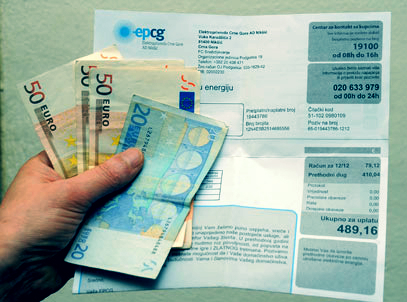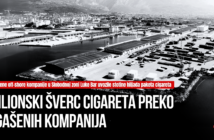 A several-month research on business activities of the Energy Regulatory Agency (RAE) undertaken by MANS has revealed numerous irregularities in the work of the present as well as former leadership of this institution and given rise to suspicion that the leaders have been abusing their official positions when making decision to the advantage of Montenegrin Electric Enterprise (EPCG) and Montenegrin Electric Transmission System (CGES) and to the detriment of the citizens of Montenegro.
A several-month research on business activities of the Energy Regulatory Agency (RAE) undertaken by MANS has revealed numerous irregularities in the work of the present as well as former leadership of this institution and given rise to suspicion that the leaders have been abusing their official positions when making decision to the advantage of Montenegrin Electric Enterprise (EPCG) and Montenegrin Electric Transmission System (CGES) and to the detriment of the citizens of Montenegro.
For this reason, this week, MANS filed five complaints to the Supreme State Prosecutor’s Office which included present members of RAE Novak Medenica, Miroslav Vukcevic, Dragutin Martinovic and Branislav Prelevic, as well as former members of the Regulatory Agency Dragoljub Draskovic, Miodrag Djekic, Branko Kotri, and Dragan Bojovic.
The RAE leaders are suspected to have adopted a methodology for calculation of the electricity prices in 2011, which included provisions in favor of energy companies, especially with regard to approving operating costs. The regulatory body is obliged to approve operating costs, or salaries, materials, services and the like, solely on the basis of the valid documents submitted by EPCG and CGES, which is not the case in practice. Instead, RAE approves operating costs which are higher than in the documents submitted by the companies.
Furthermore, an important item on electricity bills are energy companies’ investments or the rate of return on investments, which amounted to 4 percent just before the arrival of the Italian companies A2A and Terna. In 2009 and 2011 these companies became owners of EPCG and CGES, and MANS Investigation Center came into possessions of the documents that confirmed that during the negotiations for the partnership in CGES Terna explicitly requested that from 2012 the return on equity rate is 6.8 percent, with the tendency of further growth.
The RAE leaders first accepted this request through correspondence with the Italian company and the Ministry of Economy, and then formally implemented it through defining it by the methodologies, and in 2012 ensured a return on equity of 6.8 percent. The following year it was 7 percent, and in 2014 it reached 7.2 percent, which undoubtedly affected the price of electricity.
Also, for years, the RAE leaders have been approving in advance multimillion regulatory revenues based on the planned investments to the energy companies and ignoring the fact that EPCG and CGES have been failing to realize them as planned. In this connection, it is particularly interesting that RAE controls investments only on the basis of vague reports submitted by the energy companies, and fails to exercise the actual control so as to establish whether the said investments have actually been realized.
In respect of distribution and transmission losses, RAE has been determining the percentage of losses on a flat-rate basis to the detriment of final consumers. The methodologies envisaged that EPCG was to adopt a comprehensive study on the reduction of losses until April 2012 so as to determine a reasonable percentage of loss that would be paid by the consumers, which has not been done, but because of RAE’s decisions the consumers are still obliged to pay for vast technical losses of the state-owned energy company.
Finally, for five years in a row, RAE has been failing to exercise any form of supervision, thus enabling EPCG to openly violate the Energy Law, which clearly stipulates the obligation for the company to establish a separate company for distribution of electricity, so as energy activities could be performed independently of each other and in accordance with the market principles. EPCG was obliged to do so by May 2011, which has not happened so far.
All the above mentioned shows that the RAE leaders have been making absurd the primary function of this institution for years now, openly favoring the interests of the energy companies to the detriment of the public interest. This is evidenced by numerous rulings of the Administrative Court where the RAE’s decisions were declared null and void, to which the leaders of these institutions turned a deaf ear, continuing with the old practice.
RAE has not been the focus of attention of the Montenegrin State Prosecutor’s Office even though its decisions have directly affected the public interest, the purchase power of citizens, but also the profit of the energy companies, which is a situation that can no longer be tolerated. In this connection, MANS expects that the Supreme State Prosecutor’s Office, after receiving the evidence that MANS has collected, will act promptly on the complaints and ensure that someone finally answers for what have been going on in RAE for years.
RAE violated Law on Public Procurement
In 2012, 2013 and 2014 RAE grossly violated the Law on Public Procurement by abusing the direct award[A1] contract model, for which there are no public invitations for tender, which is why last month MANS lodged a separate complaint against the CEO Novak Medenica as a responsible person.
Direct award contract is a direct arrangement between the contracting authority and tenderers and it usually pertains to low value procurements. The Law on Public Procurement envisages that the allowed limit for direct contracting ranges from 7 to 10 percent of the total annual amount spent for all public procurements by the contracting authority. However, in the previous period, RAE used to spend more money for direct award contracts than prescribed by law.
Also, by analyzing the individual public procurements, MANS has found that RAE has used the shopping method and direct contracting at the same time for the same type of procurement. Thus, using the shopping method, RAE contracted services of air transport worth €35,000 with different travel agencies, and through direct contracting it spent another €12,000 for tickets.
What is particularly interesting is that during the previous three years RAE reported as its representation expenses spending in the perfumery “Bar Kod”, “Kuca hemije”, “Habitat” shop, “Voli” supermarket and “Bit Pils” store, having spent over €14,000.
This text is created with the support of the European Union within the project “Zero Tolerance to Corruption”. Network for Affirmation of Non-Governmental Sector – MANS is solely responsible for the contents of this article, and the views taken herein shall not in any case be considered as those of the European Union.



